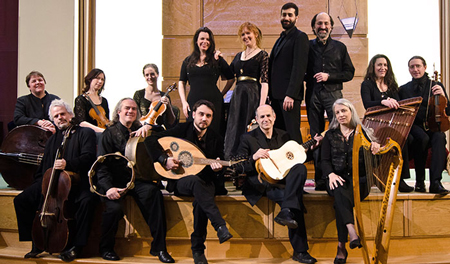by Christine Jay

The concert captured the emotions of the Spanish Jews upon their 1492 expulsion from that country, wandering on a Sephardic Journey. Their resolute craving for a spiritual home enthralls and beguiles us because we can relate to it as human beings.
The story began with two violinists, Julie Andrijeski and Adriane Post, slowly creeping down the outer aisles, yearning and conversing in exotic modes. Strauss processed down the center aisle, initiating the concert with a call to prayer. Snaidas and tenor Karim Sulayman responded to Strauss’s pleading lamentation, repeating his text Ir me Kero, Madre A Yerushalayim (I want to go to Jerusalem, mother). The chorus echoed his undulating petitions while Snaidas, Strauss, and Sulayman spoke the supplicating text — “O Jerusalem, when will I see you again?” — over the entire ensemble in Ladino (the Sephardic language), Hebrew, and Italian, respectively.
In another traditional Sephardic song arranged by Sorrell entitled Kuando el Rey Nimrod (When King Nimrod), the uplifting tune passed throughout the ensemble. After hearty applause, Sorrell spoke to the audience, explaining that the last tune was sung by the Sephardim while getting “kicked out of Spain, heads held high.” As she wrote in the program notes, “Though merry on the surface, the song is tinged with defiance.”
The pair of violinists who began the show later dazzled in Salamone Rossi Hebreo’s Sonata in Dialogo. Andrijeski began with a beautiful, longing tone complemented by Post’s optimistic interjections. Rossi and his compositions occupied a special place within the program. A contemporary of Monteverdi in Mantua, Rossi worked as an openly-Jewish composer by day at the Gonzaga Palace, then went home to write Jewish service music in his apartment in the ghetto. Apollo’s Fire performed four selections from Rossi’s Songs of Solomon, thirty-three Hebrew hymns and psalms composed in the polyphonic style. Excellently performed by the choir, Rossi’s setting of Psalm 112 (Hallelujah. Happy is one who fears the Lord) was dazzling. Its antiphonal textures and harmonies, reminiscent of Monteverdi, overlapped with a breathless courage that mirrored the steadfastness of the text.
Highlights of secular Sephardic song in the “Love & Romance” and “Feasting & Celebration” sections included Nell Snaidas’s passionate storytelling in Morena me llaman, Amanda Powell’s tender delivery of La Rosa enflorese, and Snaidas and Karim Sulayman’s powerfully sung and acted duet, Adio kerida, when Sulayman played the part of an embittered lover in a powerhouse performance.
Other memorable moments included Tina Bergman’s spirited playing on hammered dulcimer, Christa Patton’s multi-instrument performances on flutes, shawms and harp, amazing percussion interludes by Rex Benincasa, and sensational solos by oud player Brian Kay and theorbist William Simms. Sorrell ended the night with a grand flourish met with a standing ovation from the full-house crowd.
Afterglow, the CD release party for the new recording of Sephardic Journey, immediately followed the performance. While audience members bought mulled wine or burmuelos (essentially Sephardic munchkins), the performers mingled and chatted with impassioned patrons. Keith Eggeman, who may be the ensemble’s greatest fan, went from performer to performer collecting autographs on the CD’s shiny new cover. Asked why he loves the ensemble so much, he replied, “The breadth of Apollo’s Fire just amazes me.”
Published on ClevelandClassical.com February 12, 2016.
Click here for a printable copy of this article



